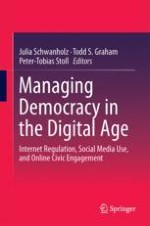2018 | OriginalPaper | Buchkapitel
2. Internet Censorship in Liberal Democracies: Learning from Autocracies?
verfasst von : Andreas Busch, Patrick Theiner, Yana Breindl
Erschienen in: Managing Democracy in the Digital Age
Aktivieren Sie unsere intelligente Suche, um passende Fachinhalte oder Patente zu finden.
Wählen Sie Textabschnitte aus um mit Künstlicher Intelligenz passenden Patente zu finden. powered by
Markieren Sie Textabschnitte, um KI-gestützt weitere passende Inhalte zu finden. powered by
